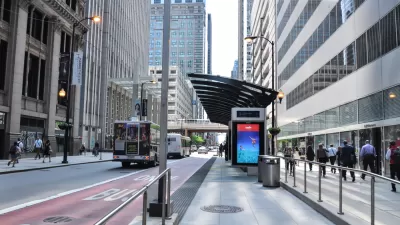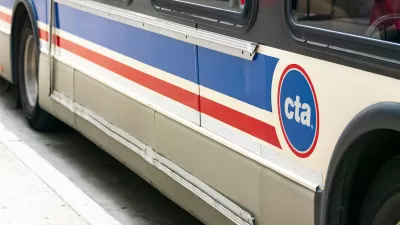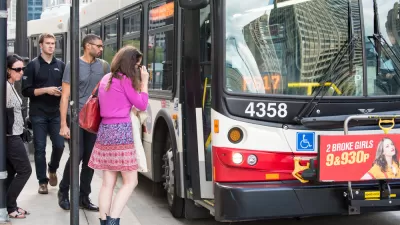Without full-time bus-only lanes, signal priority, advanced ticket sales, or all-door boarding, the Chicago Transit Authority's (CTA) tentative first steps aboard Bus Rapid Transit (BRT) may not be so speedy after all.
Jon Hilkevitch describes what will be provided when the CTA's upcoming $11 million federally funded BRT experiment launches later this year on the No. 14 route, and it seems to fall short of the standard characterization of Bus Rapid Transit.
Being careful not to offend car drivers by "imposing major negative impacts," the main features of the "BRT" that will operate on Jeffery Boulevard will be limited stops, traffic signal priority for a 1.5-mile stretch (which won't be operational until 2013), and part-time bus-only lanes, reports Hilkevitch.
New shelters, newly branded buses, and monitors inside buses displaying bus and train tracking information should help make the route feel special, even if, as Hilkevitch asserts, "the modest experiment is a far cry from CTA plans unveiled only two years ago to help address the city's congestion crisis."
"Transit officials plan to follow up with more robust BRT efforts in the central Loop in 2014 and in subsequent years on Western and Ashland avenues when money becomes available."
Yet some fear, "that the CTA's watered-down, phased-in substitute could form the public misconception that BRT isn't much of an improvement over regular express bus service, except for the fancy packaging and higher cost."
FULL STORY: CTA's bus rapid transit won't be so rapid

Planetizen Federal Action Tracker
A weekly monitor of how Trump’s orders and actions are impacting planners and planning in America.

Maui's Vacation Rental Debate Turns Ugly
Verbal attacks, misinformation campaigns and fistfights plague a high-stakes debate to convert thousands of vacation rentals into long-term housing.

Restaurant Patios Were a Pandemic Win — Why Were They so Hard to Keep?
Social distancing requirements and changes in travel patterns prompted cities to pilot new uses for street and sidewalk space. Then it got complicated.

In California Battle of Housing vs. Environment, Housing Just Won
A new state law significantly limits the power of CEQA, an environmental review law that served as a powerful tool for blocking new development.

Boulder Eliminates Parking Minimums Citywide
Officials estimate the cost of building a single underground parking space at up to $100,000.

Orange County, Florida Adopts Largest US “Sprawl Repair” Code
The ‘Orange Code’ seeks to rectify decades of sprawl-inducing, car-oriented development.
Urban Design for Planners 1: Software Tools
This six-course series explores essential urban design concepts using open source software and equips planners with the tools they need to participate fully in the urban design process.
Planning for Universal Design
Learn the tools for implementing Universal Design in planning regulations.
Heyer Gruel & Associates PA
JM Goldson LLC
Custer County Colorado
City of Camden Redevelopment Agency
City of Astoria
Transportation Research & Education Center (TREC) at Portland State University
Jefferson Parish Government
Camden Redevelopment Agency
City of Claremont





























